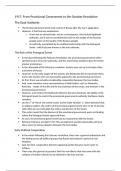1917: From Provisional Government to the October Revolution
The Dual Authority
The Provisional Government took control of Russia after the tsar’s application.
However, it had two key weaknesses:
o It was not an elected body, and as a consequence, they lacked legitimate
authority, and it had no constitutional claim to the loyalty of the Russian
people claim on the loyalty of the Russian people.
o Its authority was limited by its unofficial partnership with the Petrograd
Soviet - which became known as the Jew authority.
The Role of the Petrograd Soviet
In the days following the February Revolution, the provisional government often
seemed unsure of its own authority, and this uncertainty tended to give the Soviet
greater prominence.
In the aftermath of the February revolution, Soviets were set up in all major cities
and towns of Russia.
However, in the early stages off the Soviets, the Bolsheviks did not dominate them,
and so the Soviets were not necessarily opposed to the provisional government.
At first, there was actually considerable cooperation between the two bodies.
And, some members were representatives of both bodies, such as Alexander
Kerensky – leader of the SRs and he was chairman of the soviet, and minister in the
provisional government.
However, even before the Bolshevik influence became dominant, the ability of the
Petrograd Soviet to restrict the provisional governments authority had been clearly
revealed.
On the 1st of March, the soviet issued ‘Soviet Order Number 1’, which declared that,
in military matters, the orders of the provisional government were to be of aid only
when they do not contradict the orders and decrees of the Soviet.
This order meant that the decrees of the provisional government were not binding
unless the Petrograd Soviet approved them.
As such, the provisional government had to compromise with the Soviet.
Between February and April 1917, this arrangement worked reasonably well and
there were no serious disputes between the two bodies.
Early Political Cooperation
In the weeks following the February revolution, there was a general enthusiasm and
the feeling across all political groups that Russia had entered a period of real
freedom.
And, for time, cooperation between opposing parties became much easier to
achieve.
There was also general acceptance that the new liberty that had come with the
collapse of tsardom should not be allowed to slip into anarchy.
, This created a willingness amongst the population to support the Provisional
Government in order to avoid chaos.
Furthermore, out beginning, both the provisional government and the Petrograd
Soviet contained a wide range of political representation.
All parties, except for the Bolsheviks in the monarchists, were represented in the
provisional government during its early weeks.
As such, there was also political cooperation as the Bolsheviks were not yet in a
position to influence matters, whilst other main socialist parties for example the SRs
and the Mensheviks, were reluctant to demand too much, too soon.
They also had limited experience governing, and so had to rely on the administrators
from the old regime.
As the year went on, however, the provisional government moved increasingly to
the right, and the Soviet the left.
Early Achievements of the Provisional Government
The provisional government adopted a set of progressive measures that included:
o Amnesty for political prisoners
o Legal recognition of trade unions
o Granting a full civil and religious freedoms
o Preparations for the elections of a constituent assembly.
However, these changes did not touch on the critical issue of war and land – the first
affecting everyone, and the latter mainly affecting the peasants.
The Return of the Bolsheviks
The Impact of Stalin and Kamenev
When the Bolsheviks heard of the tsar’s abdication, they rushed back from exile.
Stalin and Kamenev returned first from internal exile in Siberia.
Lenin was stuck in Switzerland due to the war, and so tried to direct the party from
afar.
He advocated international class warfare, and ordered the Bolsheviks not cooperate
with the provisional government or with other parties.
However, Stalin and Kamenev ignored Lenin’s instructions, and wrote to the
Bolsheviks in Petrograd, telling them to pressure the provisional government to start
peace talks with Germany.
Kamenev insisted that cooperation within the provisional government was
necessary, as they were struggling with the remnants of the old regime.
He also believed the cooperation with other parties made sense, especially with the
Mensheviks, who had very similar views.
This willingness to cooperate was called ‘accommodationalism’.
Lenin’s Return in April 1917




